Damo is the first patriarch of Chan Buddhism
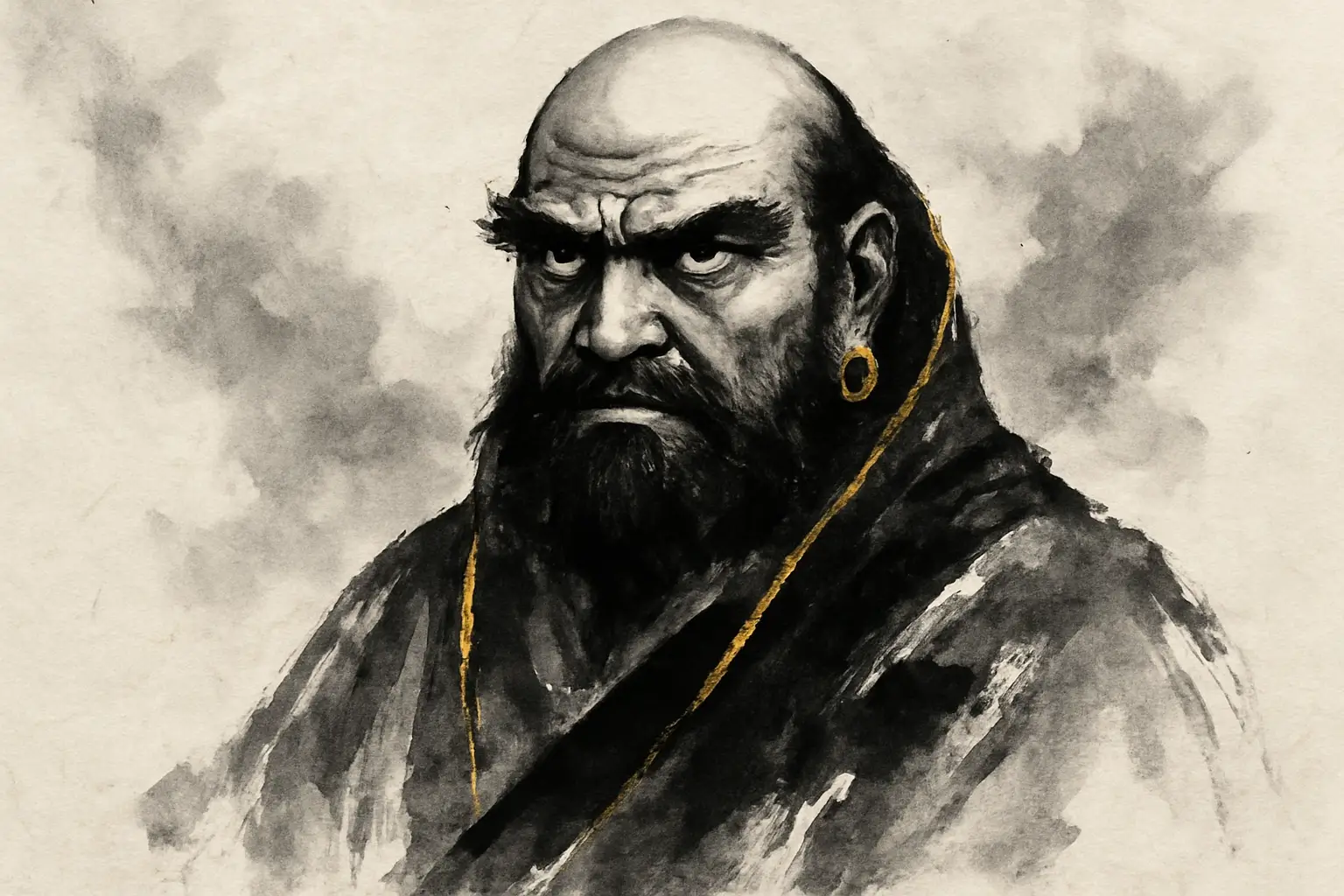
Born in 470, Damo (达摩) was the third son of an Indian brahmin. His monastic name was Bodhitara, later he was named Bodhidharma. From the Buddhist patriarch Prajnyatara, received patro and robe and came to China to transmit the dharma.
In the fall of 527 he landed in Guangzhou. He lived in Wang Guo-si (Guan Xiao-si) Monastery. Later he came to the Shaolin Monastery, lived in a cave on the Songshan Mountain. He sat in front of a wall for nine years. Combined Mahayana teachings with Dao teachings and founded the Chinese Chan trend. Passed on the cassock and patra to Hui Ke.
From that day, the Chan doctrine survived to the present day. In the kingdom of Eastern Wei, in the third year of the reign of Xiaojing-di (536) on the 5th day of the 10th lunar month, he “completely calmed down,” and was buried on Bear Mountain, near Luoyang (熊耳山,map).
Dialog between Damo and Emperor Wudi
Wu-di (梁武帝), birth name Xiao Yan (蕭衍), born 464; died 549 – Emperor of the Chinese Liang Dynasty from 502 to 549, established Buddhism in China.
Traveling by sea for three years, Bodhidharma finally reached the southern shores (of China) on September 21 of the 8th year of Pu-tung of the Liang dynasty (527).
The governor of Guangzhou, Xiao Gao, received him with all appropriate honors and sent a written report to the ruler of Wu-di. As soon as the ruler received the report, he sent a special envoy with a special invitation for Bodhidharma to his court. Finally, on October 1, the Master arrived in Jilin (present-day Nanjing, then the capital of the kingdom).
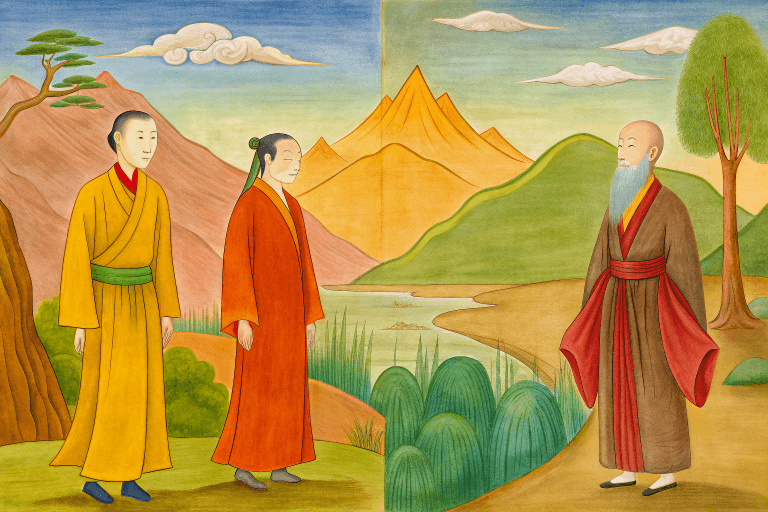
The ruler said:
– Since my first days on the throne, I have helped to rebuild monasteries, rewrite sutras, and save countless monks. Are my merits and virtues great?
– There is no merit or virtue in it, – Bodhidharma replied.
– So why is there no merit or virtue?
– From these seeds will grow only small fruits, both in the world of men and in the world of heaven, and they will be the cause of further deaths and births. They are like shadows that follow things unceasingly. They seem to exist, but in reality they are not.
– So what then are the true merits and virtues? – the ruler exclaimed.
– Pure wisdom is absolutely holistic, and the nature of its essence has no form. Therefore, the essence of such merits and virtues cannot be expressed in words.
– So what is the first principle of this Doctrine?
– Overcome yourself with absolute emptiness.
– So then who is talking to me?
– I don’t know.
The ruler could not understand these speeches of the Mentor. The preceptor, realizing that the inner nature of the ruler did not coincide with his thoughts, secretly left the place, and on the 19th of that month crossed the area south of the Yangtze. On November 23 he reached the city of Luoyang. It happened in the 10th year of the reign of Emperor Xiao-ming of the Late Wei dynasty.
Maslov, A. A. (2008). Aphorisms and Secret Sayings of Bodhidharma. Phoenix.
Damo’s first disciple cuts off his own hand
When the Buddhist monk Bodhidharma settled at Shaolin Monastery in the Songshan Mountains, he spent a long time in contemplation, facing a wall. The people living nearby discovered him and began to call him “Brahman contemplating the wall.
In those days, a monk named Shenguang lived in Luoyang for a long time and learned much about Buddhism. He realized that the teachings of Confucius and Laozi were limited to a discussion of rituals and rules, and the books on Zhuangzi and the I Ching did not explain their true meaning. One day he thought he needed someone closer to understanding the practice. Someone from whom he could gain a greater understanding of the Buddhist teachings.
A disciple of Bodhidharma hoped that his teacher would give him continuous instruction from morning till night. However, Bodhidharma instead just sat motionless in meditation, facing the wall.
Shenguang thought to himself: “The sages of ancient times were so eager to comprehend the Way that they broke bones to extract the brain, cut their veins to get wild animals drunk, scattered their hair and covered the muddy road with it to let spiritual guides walk on it, or threw themselves off a cliff to feed hungry tigers. Yes, the people of antiquity at all times behaved in this way. Who on earth am I?”
On December 9 of that year it snowed heavily. He had to be in the middle of the day, but he was still standing in front of Bodhidharma’s abode without moving. At dawn, there was so much snow that the drifts reached Shenguang’s knees.
Bodhidharma finally felt pity for him and asked:
– What do you want to get out of standing in the snow for so long?
Shenguang burst into tears and turned to the Master:
– I ask you, Master, for great compassion. Open the gates of the wondrous nectar. Give me that message which can liberate all living beings!
There is only one way to comprehend the supreme and incomparable Way of the Buddha; it requires years of effort and devotion. Even a person of low virtue, poor wisdom or dull aspirations cannot comprehend this Truth if he tries to do so without first striving for it and overcoming any obstacles in his path. It would be nothing more than a waste of time!
Hearing this from the Master, Shenguang secretly took a knife and hacked off his left hand, then placed it in front of the Master.
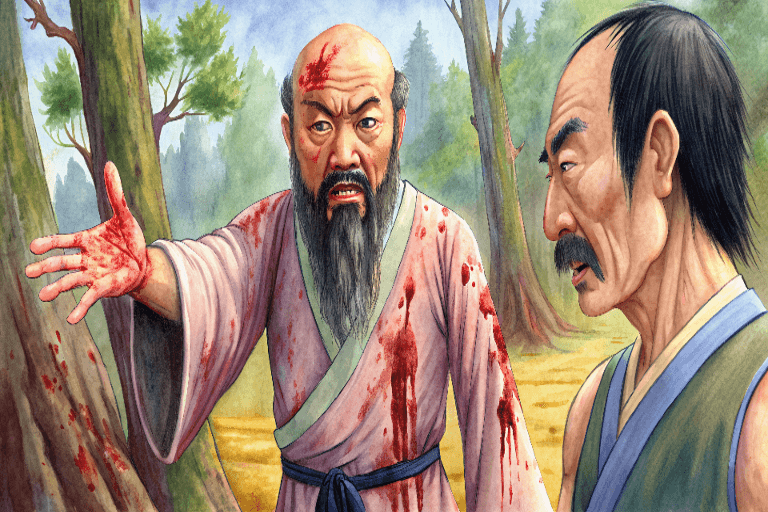
Realizing that he could be a good vessel of Dharma, Bodhidharma said, “All Buddhas in search of the true path began by forgetting their own bodies for the sake of comprehending Dharma. Now you chopped off your own hand right in front of my eyes. Well, you have the right attitude!
After that, the Preceptor gave him the name Huike, “The Knowledgeable and Capable.
Huike asked: can I learn more about the Dharma Buddha seal?
– The seal of the Buddha’s Dharma is not something that can be heard from others. It must be revealed through personal experience and reflection…,” Bodhidharma replied.
FROM THE “RECORDS OF THE TRANSMISSION OF THE LUMINARY COMPILED DURING THE JINDE YEARS”
Dao: Two Penetrations and Four Types of Acts
Bodhidharma’s General Discourse on the Four Acts Leading to the Great Chariot Path” is a 6th century treatise attributed to the legendary first patriarch Bodhidharma.
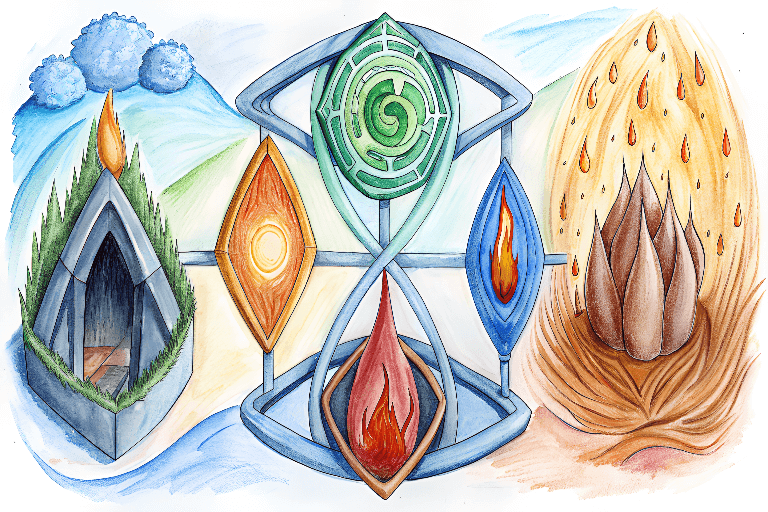
In this treatise there are two minimally necessary and sufficient ways of penetrating Chan. These ways of penetration are referred to as follows:
- Penetration through principle (quieting one’s own heart in meditation);
- Penetration through deeds (entering true knowledge through initiation).
The theory of “two penetrations” refers to the practice of Chan Buddhism, which emphasizes the duality between “penetration through [spiritual] principle” (ch. zhu li) and “penetration through deeds” (ch. zhu shi). Which essentially expresses the outer (deeds) and inner (principle) sides of Chan practice.
The first path is known as “penetration through principle. It involves recognizing that all life forms are of a fundamentally pure nature, clouded only by ignorance. One can get rid of false views and return to the true essence through meditative practices such as wall contemplation.
This principle is inherent in all living beings. If one sets aside one’s errors to return to reality and meditates deeply, the differences between oneself and others disappear; the motives of the layman and the monk become equivalent. Remain steadfast in your convictions, transcending partial knowledge–this is the harmonious abiding in harmony with the true principle. For nothing has been missed and every sense has been fully explored.
The second way is known as “penetration through practical acts.
This path includes four types of acts:
- acceptance of all sorrows;
- corresponds to the situation or nature;
- lack of desire and tranquility;
- achieving a state of harmony with the Dao.
Maslov, A. A. (2000). Letters on the water. Sphere.
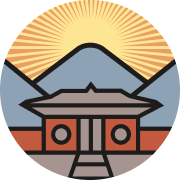
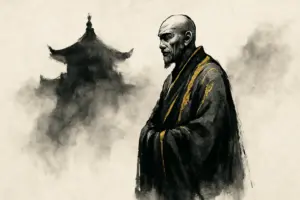
interesting take. not sure i agree 100% but… makes you think. lol
Thank you for sharing your thoughts! We’d love to help you work on this specifically in class. Best regards on your path.
Typo in the second paragraph… just saying. grammar nazi here sorry!!
You are asking the right questions. Our community is very supportive of beginners. Warmly, the Team.
Been following this blog for a while. good stuff mostly )
You are asking the right questions. Master Shi Yanchen always says that patience is the first skill to learn. Let us know if you have any other questions.
Interesting take. Not sure I agree 100% but… makes you think. …
Hello! That’s actually a great point. Our doors are always open if you want to try a session in person. You’re welcome to join our next seminar to explore this deeper.
Been following this blog for a while. good stuff mostly.
I appreciate your honesty here. We’d love to help you work on this specifically in class. Let us know if you have any other questions.
This is a very common feeling, don’t worry. It might feel difficult now, but consistency brings amazing results. Hope to see you on the mats soon!
The quietening of heart can be obtained. Once obtained, your high blood pressure comes down and even high blood sugar.
In order to do that meditating with feeling of chi coming through from the crown of head …feeling a coolness and going through a void helps.
Of course, need to give up all desires, fears and worries. Just Be. 😊
Thank you for your insightful comment on the article about Damo, the first patriarch. The practice of quietening the heart indeed has profound benefits for both mental and physical health, as you mentioned. Meditation, especially with a focus on the flow of chi and the sensation of coolness, can be incredibly effective in reducing stress, lowering blood pressure, and stabilizing blood sugar levels.
Your advice to let go of desires, fears, and worries resonates deeply with the teachings of Damo and many other spiritual traditions. By embracing a state of simply being, we can cultivate inner peace and harmony.
Thank you for sharing your wisdom. 😊
Been following this blog for a while. good stuff mostly
Thanks for asking! You don’t need to be perfect, you just need to be present. Warmly, the Team.
typo in the second paragraph… just saying. grammar nazi here sorry!! lol
This is a very common feeling, don’t worry. Master Shi Yanchen always says that patience is the first skill to learn. Looking forward to training with you.
Question – how does this apply to real sparring? theory is nice but… )
Great question, happy to help with this. Master Shi Yanchen always says that patience is the first skill to learn. You’re welcome to join our next seminar to explore this deeper.
Been following this blog for a while. good stuff mostly
Hello! That’s actually a great point. We focus a lot on correct structure so you can progress safely. Feel free to drop by for a trial class anytime.
I love the history of Damo and it’s going to change my life if I step in I am changing my name to Damo
Be diligent in learning and avoid extremes